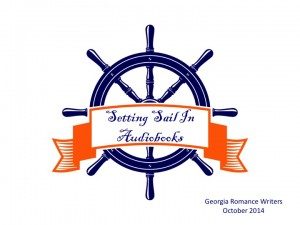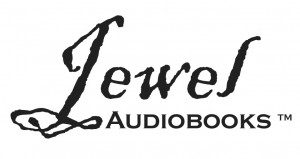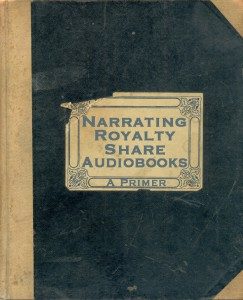On Friday, 10 October 2014, I presented the topic “Setting Sail In Audiobooks” at the Georgia Romance Writers’ (GRW) annual Moonlight and Magnolias Conference. Although I gave a polished talk with a fabulous multimedia presentation, the overall experience is not one I want to repeat any time soon.
I’ll be honest — before yesterday, I had never given this sort of presentation. I had done presentations in my government career, of course, so I had no fear of speaking to a group.
I raise the point about this kind of presentation because a more experienced public speaker might have been able to avoid the technical and communications problems I encountered. I therefore thought it might be helpful to share some things that could have gone better to save others from a similar plight.
1. Only go when you are INVITED.
In January of 2014, I sent a message to the Georgia Romance Writers to inquire about speaking to their group about audiobooks at a monthly meeting and/or the annual conference. The conference chairperson responded that I could submit a workshop proposal for the conference. If my proposal was selected, I would have to pay the conference registration fee for attendees.
I responded that I was unwilling to pay registration fees since I wouldn’t be an attendee. My thinking was that I was offering to HELP them for free. I certainly was not going to PAY for the privilege of spending my time, energy, and creativity in developing an engaging and informative talk and then more time at the actual presentation.
In March, after the proposal window had closed, the conference chairperson wrote to me:
Are you still interested in presenting at the Moonlight & Magnolias conference in October? We have an opening in the workshop schedule, and since you’re local and provide a service to authors, we’re willing to waive the registration requirement.
My gut whispered to me that they didn’t want ME. They just wanted someone to FILL A SLOT and were SETTLING for me “since I’m local and provide a service to authors”. I chose to dismiss those thoughts, telling myself they were just my own inner resistance to stepping outside my comfort zone instead of a warning signal. I responded that I would be delighted to accept the slot.
2. Ask for equipment to transmit both the computer video and AUDIO.
I had to submit my equipment requests in June, long before I started creating my slide show. Even though my topic was AUDIObooks and AUDIO is my life, I didn’t think to specifically ask for equipment to transmit my computer AUDIO along with the screen display.
My snazzy slide show included 4 terrific videos that demonstrated key points. As I practiced my speech last week, I suddenly realized that the projector might not transmit the computer’s audio. I wrote to the conference coordinator, who said they only had a projector, and she didn’t think she could get speakers for my computer. She referred me to the hotel contact person to solve the audio problem. I’m guessing that no one at previous GRW conferences has ever had a multimedia show, so no one ever thought of or asked for audio equipment.
The hotel was only providing a microphone and podium. However, it could easily include the additional sound mixer configuration for my computer audio for an additional $130. GRW apparently was unwilling or unable to pay the additional fee.
]I had to solve the audio problem. My choices were:
- Pay the hotel the $130 to set up the additional equipment.
- Take an external speaker from home, perhaps even a studio monitor.
- Remove the videos from the slide show.
I decided to take a Bluetooth speaker. I had to hold my microphone in front of the speaker in order to project its sound throughout the large ballroom. I’ll have more to say about this solution in subsequent points.
3. Test and re-test every aspect of your slide show.
My laptop worked well with a Bluetooth speaker that we had purchased from Williams and Sonoma. Unfortunately, I didn’t realize that it must time-out after a certain amount of inactivity. When I got to the 2 videos at the end of my presentation, the Bluetooth speaker wouldn’t play the sound. I might have discovered that fact if I had played all of my videos with the external speaker during my rehearsals.
4. Ensure that your name and presentation name are the way you want them to appear on the schedule and program.
When I received the conference schedule in September, I just looked for my name to see the date and time of my session. I didn’t notice that my session title was listed as the very bland and vague “Audiobook Presentation” instead of the name I had given it “Setting Sail In Audiobooks”.
Of all the presentations, mine was the only one with such a non-descript name. The other presentations retained the names given them by the speakers. Some of the presentation names contained more characters than mine, so my presentation name would have fit in the space provided.
I only noticed this undesirable and unauthorized change on Thursday night before my Friday session. Sure enough, the printed program listed my presentation name as “Audiobook Presentation”. This name probably translated into a lower attendance level for my session.
At least my name was spelled correctly.

The slides continued the sailing theme.
5. Visit the room where you’ll present and know how the equipment will be configured at least 1 day before your session.
I did visit the hotel the day before the conference. I stood on the stage at the podium in a ballroom of 25 tables with 10 chairs at each table. I envisioned the room full to capacity of people who were interested in my topic and excited to get my information about using ACX to create audiobooks.
The hotel A/V director told me that GRW had not ordered a screen for Friday. I had to send yet another message to the conference chairperson about the screen. She assured me that they would have a screen for Friday.
I naively thought that in the ballroom setup, the screen would be ON THE STAGE, behind me at the podium. I didn’t know until I got in the room for my session that the screen was a small thing set off in the far corner with a projector on top of a table! I asked them to move the table and screen closer to me so that I could still use the podium. I didn’t want to hold the mic for the entire session while also bending down to the table to read my presenter notes from my computer.
On Monday, I had asked the conference chairperson what kind of cable connected to the projector. I didn’t get that answer until I walked in the room on Friday.
6. Plan for all contingencies.
Take all kinds of cables and adapters that you might need. I had both HDMI and VGA cables and adapters so that I was prepared for any projector connection.
Print your presentation notes. Thank heaven I had taken this step because Powerpoint on my Mac never gave me the option for dual monitors. The attendees viewed the slide show, and I referred to my paper notes.
Make sure your printed presentation notes include the latest tweaks. I had changed the order of a couple of notes on Friday morning but didn’t print them. I was a little thrown during the presentation when the sequence was wrong.
7. Learn your moderator’s name and go over logistics and details the day before your session.
If I were a conference chairperson, I’d make sure that:
- every session speaker knew the name and contact info of the session moderator
- the moderator would ensure that the speaker had everything she needed and felt welcome
- the moderator would be on hand to help the speaker get into the room
The GRW conference chairperson sent me no information other than the fact that I would have a moderator. She also said she’d be around to help connect the computer to the projector.
As a person outside of the organization, I expected more consideration and communication than I received. I’m sure it’s a big job to plan a conference, so perhaps the chairperson was overwhelmed by the task. I can see now that I should have been persistent with my questions until I got answers.
I met my moderator about 3:55pm for my 4:00pm session.
8. Be self-reliant.
I can thank my parents, perhaps especially my mother, for teaching me this lesson early in life.
No one from GRW met me after I arrived at the hotel to help unload my car. I had already planned to get one of the hotel luggage carts to unload my briefcase with computer, a box of postcards for my door prizes, and a gift basket and 4 gift bags for door prizes. Fortunately, the bellman said I could use the cart for the next hour. I actually kept it for 2 hours since I didn’t have time to return it before I started my presentation.
I met my moderator as we were walking in the door. I appreciated her help during the setup, and the conference coordinator did come back and help her move the table and projector. I thought I was going to have to do it.
9. If you are giving away door prizes, offer raffle tickets as people walk in the door.
To celebrate my latest audiobook and first romance FOR A GOOD TIME, CALL…, I made 4 gift bags and 1 grand prize gift basket containing some cool swag that ACX and Belle Books generously provided to me along with all of the types of candy mentioned in the book. I had printed postcards and attached stickers to 5 of them. My plan was to pass out the cards at a certain point during the presentation and determine the winners before I ended my talk. I inserted the marked cards throughout my box of postcards.
I was shocked and dismayed when only about 25 people showed up for my presentation.
My moderator passed out my cards at the appointed time. When it came time to determine the winners, no one had a winning card. I was reminded of Michael Scott’s “Golden Ticket” idea in The Office. His hidden golden ticket idea didn’t work out well for him, and my specially-marked postcards didn’t work out well for me. It would have been so much easier and cheaper if I had just handed out raffle tickets to give away my door prizes.
10. Give your best to the people who came to hear your talk.
The show must go on, so you’ve got to make lemonade….or something like that. Even though the size of my audience was not optimal, I knew that the people who were there came to hear me and wanted to learn about creating audiobooks. I did everything I could to make my presentation outstanding.
Well, I mostly did everything, but I wish I could’ve done something about the Bluetooth speaker so they could hear my last 2 videos. Those videos featured Colin Firth and Steve Martin. Just think — I was sharing a stage with Colin Firth and Steve Martin, but no one in the audience could hear them! 🙂
The people in the ballroom before me didn’t finish on time and wouldn’t leave the room until my moderator ushered them out after 4pm. I was late setting up, which made me even later in starting. I wanted to finish on time so I wouldn’t be rude to the person who was scheduled to speak at 5pm. Perhaps if I hadn’t felt so rushed for time, I might have troubleshot the Bluetooth speaker for a moment.
I really appreciated the attendees’ interest. A few people asked very thoughtful and intelligent questions at the end, and I had a delightful hallway conversation with one author as I was leaving.
I didn’t leave any business cards or my stack of postcards in their goody room. My hand-out in their binder included a copy of my business card and a link to a document I’ve compiled of audiobook resources for authors.
*******************
I spent months researching and collecting ideas for this presentation and weeks in creating the slide show. It would be a shame if all of that time, thought, energy, creativity, and money only benefitted the people who were in the room yesterday. Therefore, I’m going to convert my show to a video and add narration to it.
I may not ever present in person again at GRW, or any other writers’ organization, but I will continue to help authors through my blogs, videos, and forum posts.



